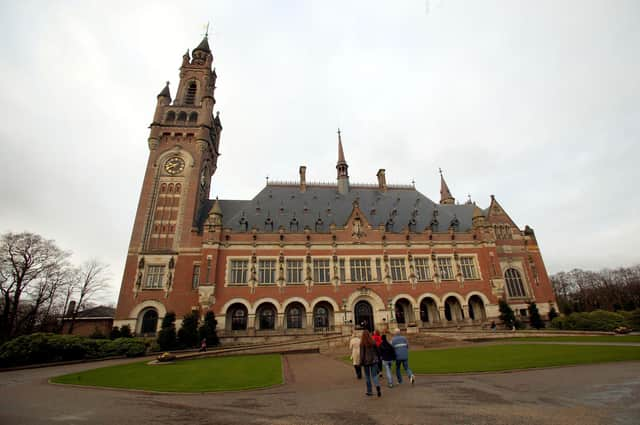Vienna Convention on Diplomatic Relations: How one treaty united the world and is helping Scotland step onto the international stage – Dr Paul Behrens


This month alone, ten Russian diplomats were expelled from the United States amid allegations of interference in the last presidential elections, China summoned the Japanese ambassador after Japan said it would release water from the Fukushima plant into the sea, and in London, the deposed ambassador of Myanmar had to sleep in his car after his military attaché locked him out of his embassy.
The handling of diplomatic affairs also reveals a lot about politics at home. Last week, Joe Biden made headlines when he announced his intention to appoint nine career diplomats to ambassadorial posts in a break from previous administrations – Republican and Democrat alike – who often gave ambassadorships to party donors and other people who were good buddies, but not always good diplomats.
Advertisement
Hide AdAdvertisement
Hide AdThe treaty that governs diplomatic relations, the Vienna Convention on Diplomatic Relations, recently celebrated its 60th birthday. When it turned 50, there were not many events to mark the occasion – apart, ahem, from a conference at Edinburgh University – and there is no reason to expect exuberant jollities this time either.
Diplomatic law has a bad press, sometimes with reason. Events like the tragic killing of Harry Dunn and the claim of immunity by the driver of the car that struck him contribute to that. And yet, there is little appetite to change the rules.
Over the years, one truth has filtered through – if you get rid of diplomatic immunity for the bad apples, you also abolish it for the good ones (which hopefully include our own envoys). That puts them at the mercy of their hosts, and not all hosts are trustworthy. If you have diplomats, say, in North Korea, you think twice about ditching diplomatic immunity.
Something else which is often overlooked is that diplomatic immunity is not the only issue the Vienna Convention deals with. It speaks of the promotion of friendly relations – and a lot of everyday diplomatic work is about that.
It gives diplomats the rights they need to carry out their tasks: freedom of communication, freedom of movement and inviolability of the diplomatic bag. It protects embassies, as well as the private homes of diplomats.
What is more, if things do go wrong, there are ways to deal with that. Diplomats who abuse their immunity can be expelled and may be sued in their own states. There is also an ‘optional protocol’ which allows for conciliation, arbitration and action before the International Court of Justice.
But it is true that not all of these means are convincing. In 2018, the Trump administration showed just how weak they can be, when it simply declared that the United States would withdraw from that protocol. That makes one thing clear – the world has its hands full trying to bind states to the existing law. New inventions, such as another treaty that would limit diplomatic immunity, are not likely to be terribly popular.
That, at least, is an advantage of the Vienna Convention; there is something to be said for an instrument on which almost the entire world agrees (it has no fewer than 192 parties). And its success goes further than that. Some of its rules were taken aboard by other treaties. For instance, the European External Action Service (EEAS), the diplomatic arm of the European Union, takes the Vienna immunities as the standard it seeks for its own missions.
Advertisement
Hide AdAdvertisement
Hide AdAt the same time, this marks one the most exciting developments in this area – new players have appeared in international relations and it is no longer states alone that need to protect their diplomats. The EEAS itself has 140 delegations around the world and employs more than 3,000 people. Brexit, sadly, left its traces here as well; work at the EEAS is generally reserved to EU citizens, so quite a few job opportunities were lost when the UK made its goodbyes.
But it is not only the EU that has become more active. Regions are getting involved in international relations too, even if they are not independent states.
Quebec has a whole network of offices around the world, ranging from general delegations to trade offices. The Scottish government lists, among its international offices, representations in Beijing, Berlin, Brussels, Dublin, Ottawa, Paris, Washington DC – and London (the cheek!).
There are already quite a few consulates in Edinburgh and the Scottish government plays its role on the international stage; the aftermath of Brexit saw several visits by Nicola Sturgeon to EU institutions and EU member states, which made headlines at home and abroad.
It is not without irony that, at a time when the UK's standing in international relations is at a low point, its constituent nations step into the breach. But it is no surprise. Diplomatic relations have always offered opportunities to those willing to take an active part.
And who knows? After what we have seen of Boris Johnson's treatment of international law, it is entirely possible that some of the new players of diplomacy are much better at understanding the rules than those who should be seasoned players of the game.
Dr Paul Behrens is author of Diplomatic Interference and the Law and editor of Diplomatic Law in a New Millennium. He teaches diplomatic law at the University of Edinburgh.
